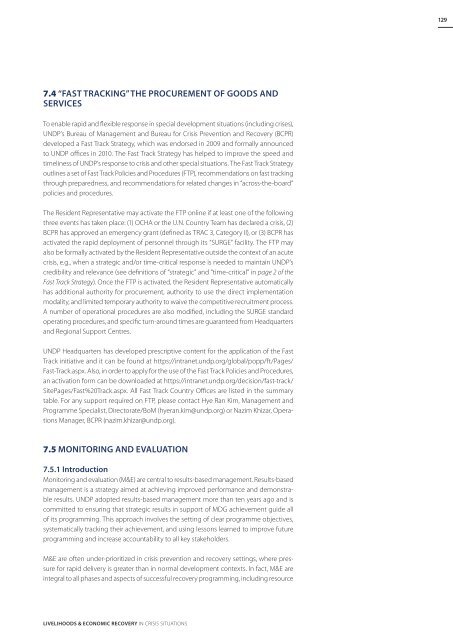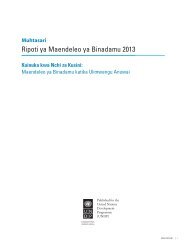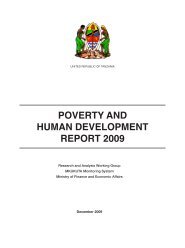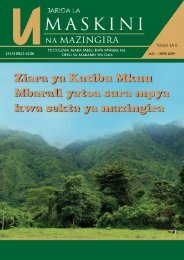Download PDF (4.08 MB) - ReliefWeb
Download PDF (4.08 MB) - ReliefWeb
Download PDF (4.08 MB) - ReliefWeb
Create successful ePaper yourself
Turn your PDF publications into a flip-book with our unique Google optimized e-Paper software.
129<br />
7.4 “Fast Tracking” the Procurement of Goods and<br />
Services<br />
To enable rapid and flexible response in special development situations (including crises),<br />
UNDP’s Bureau of Management and Bureau for Crisis Prevention and Recovery (BCPR)<br />
developed a Fast Track Strategy, which was endorsed in 2009 and formally announced<br />
to UNDP offices in 2010. The Fast Track Strategy has helped to improve the speed and<br />
timeliness of UNDP’s response to crisis and other special situations. The Fast Track Strategy<br />
outlines a set of Fast Track Policies and Procedures (FTP), recommendations on fast tracking<br />
through preparedness, and recommendations for related changes in “across-the-board”<br />
policies and procedures.<br />
The Resident Representative may activate the FTP online if at least one of the following<br />
three events has taken place: (1) OCHA or the U.N. Country Team has declared a crisis, (2)<br />
BCPR has approved an emergency grant (defined as TRAC 3, Category II), or (3) BCPR has<br />
activated the rapid deployment of personnel through its “SURGE” facility. The FTP may<br />
also be formally activated by the Resident Representative outside the context of an acute<br />
crisis, e.g., when a strategic and/or time-critical response is needed to maintain UNDP’s<br />
credibility and relevance (see definitions of “strategic” and “time-critical” in page 2 of the<br />
Fast Track Strategy). Once the FTP is activated, the Resident Representative automatically<br />
has additional authority for procurement, authority to use the direct implementation<br />
modality, and limited temporary authority to waive the competitive recruitment process.<br />
A number of operational procedures are also modified, including the SURGE standard<br />
operating procedures, and specific turn-around times are guaranteed from Headquarters<br />
and Regional Support Centres.<br />
UNDP Headquarters has developed prescriptive content for the application of the Fast<br />
Track initiative and it can be found at https://intranet.undp.org/global/popp/ft/Pages/<br />
Fast-Track.aspx. Also, in order to apply for the use of the Fast Track Policies and Procedures,<br />
an activation form can be downloaded at https://intranet.undp.org/decision/fast-track/<br />
SitePages/Fast%20Track.aspx. All Fast Track Country Offices are listed in the summary<br />
table. For any support required on FTP, please contact Hye Ran Kim, Management and<br />
Programme Specialist, Directorate/BoM (hyeran.kim@undp.org) or Nazim Khizar, Operations<br />
Manager, BCPR (nazim.khizar@undp.org).<br />
7.5 Monitoring and Evaluation<br />
7.5.1 Introduction<br />
Monitoring and evaluation (M&E) are central to results-based management. Results-based<br />
management is a strategy aimed at achieving improved performance and demonstrable<br />
results. UNDP adopted results-based management more than ten years ago and is<br />
committed to ensuring that strategic results in support of MDG achievement guide all<br />
of its programming. This approach involves the setting of clear programme objectives,<br />
systematically tracking their achievement, and using lessons learned to improve future<br />
programming and increase accountability to all key stakeholders.<br />
M&E are often under-prioritized in crisis prevention and recovery settings, where pressure<br />
for rapid delivery is greater than in normal development contexts. In fact, M&E are<br />
integral to all phases and aspects of successful recovery programming, including resource<br />
Livelihoods & Economic Recovery in Crisis Situations





